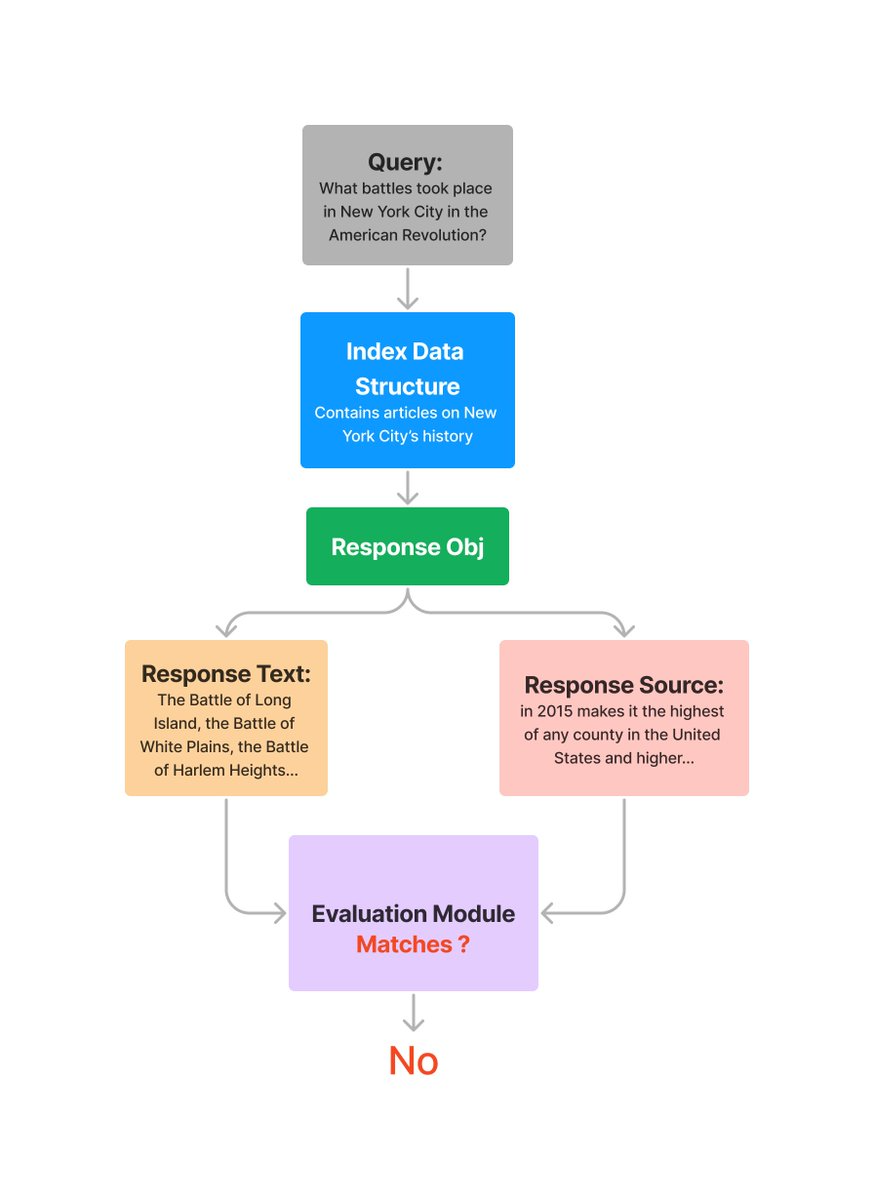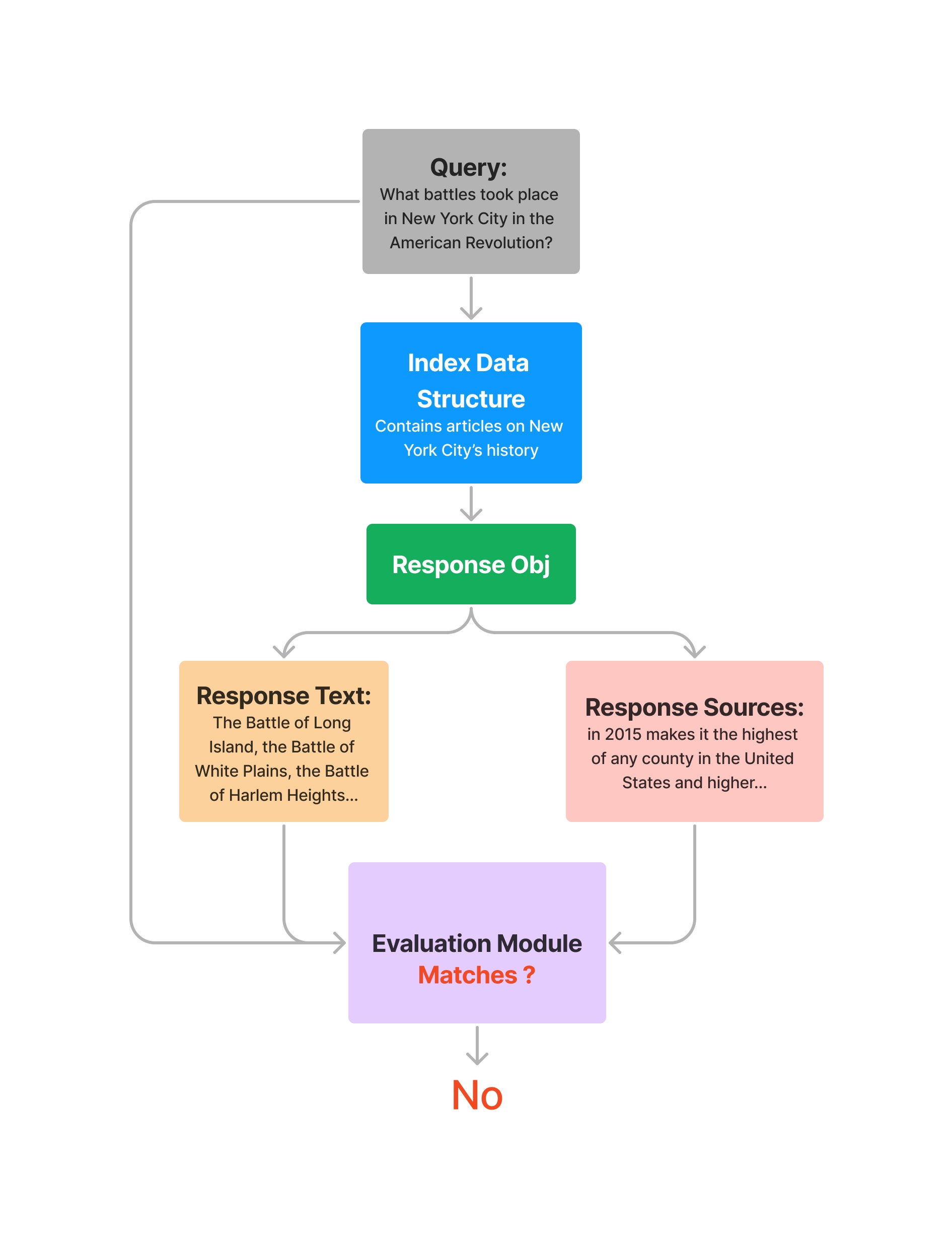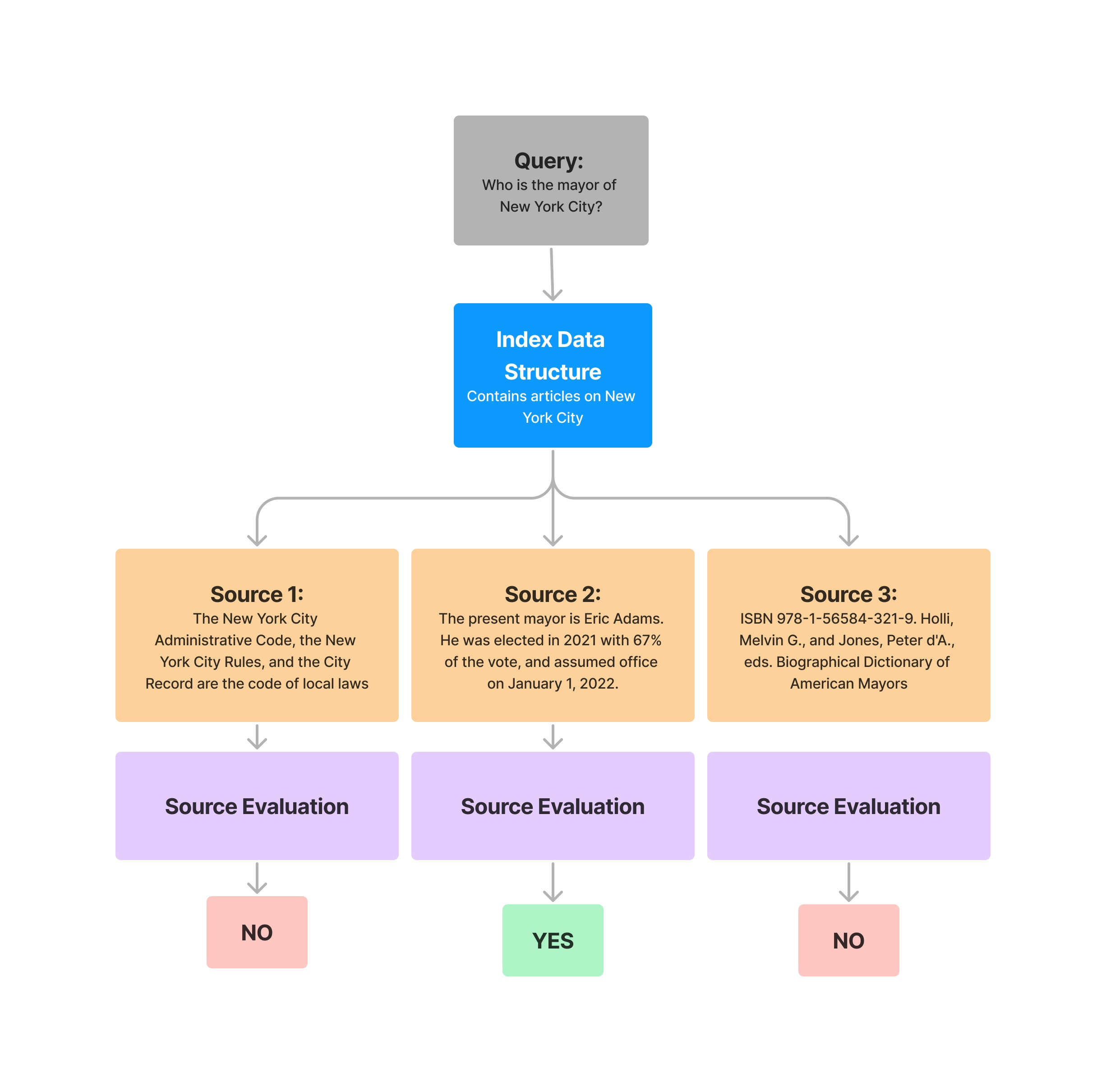Usage Pattern (Response Evaluation)
Using BaseEvaluator
Section titled “Using BaseEvaluator”All of the evaluation modules in LlamaIndex implement the BaseEvaluator class, with two main methods:
- The
evaluatemethod takes inquery,contexts,response, and additional keyword arguments.
def evaluate( self, query: Optional[str] = None, contexts: Optional[Sequence[str]] = None, response: Optional[str] = None, **kwargs: Any, ) -> EvaluationResult:- The
evaluate_responsemethod provide an alternative interface that takes in a llamaindexResponseobject (which contains response string and source nodes) instead of separatecontextsandresponse.
def evaluate_response( self, query: Optional[str] = None, response: Optional[Response] = None, **kwargs: Any,) -> EvaluationResult:It’s functionally the same as evaluate, just simpler to use when working with llamaindex objects directly.
Using EvaluationResult
Section titled “Using EvaluationResult”Each evaluator outputs a EvaluationResult when executed:
eval_result = evaluator.evaluate(query=..., contexts=..., response=...)eval_result.passing # binary pass/faileval_result.score # numerical scoreeval_result.feedback # string feedbackDifferent evaluators may populate a subset of the result fields.
Evaluating Response Faithfulness (i.e. Hallucination)
Section titled “Evaluating Response Faithfulness (i.e. Hallucination)”The FaithfulnessEvaluator evaluates if the answer is faithful to the retrieved contexts (in other words, whether if there’s hallucination).
from llama_index.core import VectorStoreIndexfrom llama_index.llms.openai import OpenAIfrom llama_index.core.evaluation import FaithfulnessEvaluator
# create llmllm = OpenAI(model="gpt-4", temperature=0.0)
# build index...
# define evaluatorevaluator = FaithfulnessEvaluator(llm=llm)
# query indexquery_engine = vector_index.as_query_engine()response = query_engine.query( "What battles took place in New York City in the American Revolution?")eval_result = evaluator.evaluate_response(response=response)print(str(eval_result.passing))
You can also choose to evaluate each source context individually:
from llama_index.core import VectorStoreIndexfrom llama_index.llms.openai import OpenAIfrom llama_index.core.evaluation import FaithfulnessEvaluator
# create llmllm = OpenAI(model="gpt-4", temperature=0.0)
# build index...
# define evaluatorevaluator = FaithfulnessEvaluator(llm=llm)
# query indexquery_engine = vector_index.as_query_engine()response = query_engine.query( "What battles took place in New York City in the American Revolution?")response_str = response.responsefor source_node in response.source_nodes: eval_result = evaluator.evaluate( response=response_str, contexts=[source_node.get_content()] ) print(str(eval_result.passing))You’ll get back a list of results, corresponding to each source node in response.source_nodes.
Evaluating Query + Response Relevancy
Section titled “Evaluating Query + Response Relevancy”The RelevancyEvaluator evaluates if the retrieved context and the answer is relevant and consistent for the given query.
Note that this evaluator requires the query to be passed in, in addition to the Response object.
from llama_index.core import VectorStoreIndexfrom llama_index.llms.openai import OpenAIfrom llama_index.core.evaluation import RelevancyEvaluator
# create llmllm = OpenAI(model="gpt-4", temperature=0.0)
# build index...
# define evaluatorevaluator = RelevancyEvaluator(llm=llm)
# query indexquery_engine = vector_index.as_query_engine()query = "What battles took place in New York City in the American Revolution?"response = query_engine.query(query)eval_result = evaluator.evaluate_response(query=query, response=response)print(str(eval_result))
Similarly, you can also evaluate on a specific source node.
from llama_index.core import VectorStoreIndexfrom llama_index.llms.openai import OpenAIfrom llama_index.core.evaluation import RelevancyEvaluator
# create llmllm = OpenAI(model="gpt-4", temperature=0.0)
# build index...
# define evaluatorevaluator = RelevancyEvaluator(llm=llm)
# query indexquery_engine = vector_index.as_query_engine()query = "What battles took place in New York City in the American Revolution?"response = query_engine.query(query)response_str = response.responsefor source_node in response.source_nodes: eval_result = evaluator.evaluate( query=query, response=response_str, contexts=[source_node.get_content()], ) print(str(eval_result.passing))
Question Generation
Section titled “Question Generation”LlamaIndex can also generate questions to answer using your data. Using in combination with the above evaluators, you can create a fully automated evaluation flow over your data.
from llama_index.core import SimpleDirectoryReaderfrom llama_index.llms.openai import OpenAIfrom llama_index.core.llama_dataset.generator import RagDatasetGenerator
# create llmllm = OpenAI(model="gpt-4", temperature=0.0)
# build documentsdocuments = SimpleDirectoryReader("./data").load_data()
# define generator, generate questionsdataset_generator = RagDatasetGenerator.from_documents( documents=documents, llm=llm, num_questions_per_chunk=10, # set the number of questions per nodes)
rag_dataset = dataset_generator.generate_questions_from_nodes()questions = [e.query for e in rag_dataset.examples]Batch Evaluation
Section titled “Batch Evaluation”We also provide a batch evaluation runner for running a set of evaluators across many questions.
from llama_index.core.evaluation import BatchEvalRunner
runner = BatchEvalRunner( {"faithfulness": faithfulness_evaluator, "relevancy": relevancy_evaluator}, workers=8,)
eval_results = await runner.aevaluate_queries( vector_index.as_query_engine(), queries=questions)Integrations
Section titled “Integrations”We also integrate with community evaluation tools.
DeepEval
Section titled “DeepEval”DeepEval offers 6 evaluators (including 3 RAG evaluators, for both retriever and generator evaluation) powered by its proprietary evaluation metrics. To being, install deepeval:
pip install -U deepevalYou can then import and use evaluators from deepeval. Full example:
from llama_index.core import VectorStoreIndex, SimpleDirectoryReaderfrom deepeval.integrations.llama_index import DeepEvalAnswerRelevancyEvaluator
documents = SimpleDirectoryReader("YOUR_DATA_DIRECTORY").load_data()index = VectorStoreIndex.from_documents(documents)rag_application = index.as_query_engine()
# An example input to your RAG applicationuser_input = "What is LlamaIndex?"
# LlamaIndex returns a response object that contains# both the output string and retrieved nodesresponse_object = rag_application.query(user_input)
evaluator = DeepEvalAnswerRelevancyEvaluator()evaluation_result = evaluator.evaluate_response( query=user_input, response=response_object)print(evaluation_result)Here is how you can import all 6 evaluators from deepeval:
from deepeval.integrations.llama_index import ( DeepEvalAnswerRelevancyEvaluator, DeepEvalFaithfulnessEvaluator, DeepEvalContextualRelevancyEvaluator, DeepEvalSummarizationEvaluator, DeepEvalBiasEvaluator, DeepEvalToxicityEvaluator,)To learn more on how to use deepeval’s evaluation metrics with LlamaIndex and take advantage of its full LLM testing suite, visit the docs.